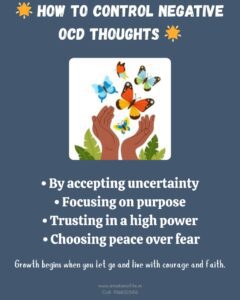
How to Control Negative Thoughts in OCD
Living with negative thoughts in OCD is not just about facing occasional anxiety. It is a persistent internal battle where the mind becomes a source of discomfort, looping distressing thoughts that feel impossible to stop. These thoughts may be intrusive, repetitive, or fear-inducing, and they often lead to compulsions or rituals intended to relieve the tension — temporarily.
But these thoughts are not a true reflection of your values or reality. Instead, they represent a pattern of overthinking and misinterpretation triggered by the condition. At Emotion of Life, we understand how overwhelming this can be. That’s why managing negative thoughts in OCD must begin with awareness, acceptance, and a structured approach to reclaim control — not over the thoughts, but over how you relate to them.
This document explores what these thoughts are, how they form, and most importantly, how they can be addressed through healthy actions and mindset shifts.
What Are Negative Thoughts in OCD?
In OCD (Obsessive-Compulsive Disorder), negative thoughts — also known as intrusive thoughts — are unwanted mental images, ideas, or impulses that repeatedly enter the mind. These thoughts often feel distressing because they are inconsistent with a person’s values, identity, or desires. For example:
- A kind person may have sudden thoughts of harming someone
- A faithful individual may experience blasphemous ideas
- A loving parent may imagine harming their child
- Someone with strong morals may question their own character
The key feature is not the content of the thought, but the intense need to neutralize, understand, or prevent the thought from coming true. This is what drives the compulsive behaviors or mental rituals that characterize OCD.
Why Do These Thoughts Feel So Real?
People without OCD may also have strange or inappropriate thoughts from time to time — but they dismiss them easily. For someone struggling with negative thoughts in OCD, however, the brain misinterprets these thoughts as threats or signs of moral failure. As a result:
- The thought feels like an emergency
- The person tries to fight or “solve” it
- Attention and fear give the thought more power
- A loop is created between thought and compulsion
This loop becomes exhausting and confusing. That’s why negative thoughts in OCD aren’t just “overthinking” — they are a disruption in how the brain evaluates fear, threat, and certainty.
How to Control Negative Thoughts in OCD
At Emotion of Life, we recognize the importance of responding to intrusive thoughts with conscious awareness and purposeful living. Here’s how to address negative thoughts in OCD through healthy mindset shifts and actions:
- We do not need to try to control the future
Trying to predict or control the future is one of the primary mental traps in OCD. The mind assumes that if it can prevent a disaster, it must — and that failure to do so could be catastrophic. This belief creates anxiety, guilt, and constant mental strain.
But the future is, by nature, uncertain. The more we try to control it, the more we suffer. Real peace begins with releasing this illusion of control and focusing instead on how we respond in the present moment. Let the future unfold — your job is not to control it, but to live today well.
- Focus on your life purpose and future goal
When thoughts become obsessive, it’s easy to lose sight of what really matters. Having a clear sense of purpose acts like an internal compass. It reminds you of who you are beyond your fears.
Your goals may involve your family, career, service, spirituality, or personal growth. Focusing on these areas allows you to build an identity not based on fear, but on meaning. Negative thoughts in OCD may still arise, but your purpose will help you walk past them without losing your way.
- We need to do age-appropriate action
OCD often exaggerates responsibility. A child may feel the weight of an adult’s concerns. An adult may carry burdens that don’t belong to them. Age-appropriate action means stepping into your real role, not the one fear invents.
Ask yourself: “Would a person my age and in my situation truly be expected to carry this?” If not, gently let it go. Taking responsibility is healthy — over-responsibility is not. This distinction reduces stress and prevents burnout.
- Trust in God. He has sent us here in this universe and already caring and managing our life and trouble
Faith can be a powerful resource when dealing with obsessive fears. Believing in a higher power offers comfort in the face of uncertainty. It also removes the false pressure of needing to manage everything yourself.
By trusting that you are being guided and protected, you loosen the mental grip of control. Let God or the universe carry what you cannot. This spiritual perspective can dissolve fear in a way logic never could.
- Since we have been born, we are in the positive and plus side of life; we have not lost much
This is a powerful reframe. Instead of focusing on potential loss or risk, recognize how much you already have. From birth to today, you’ve made it through challenges, growth, learning, and survival.
This perspective helps reverse the negativity bias created by OCD. You are not in deficit. You are on the plus side of life. And the presence of fear does not erase the progress you’ve already made.
- We need to accept whatever happens in our life. It happens for good only; whatever is going to happen, that will also happen for our good
Acceptance is not passive. It is a decision to stop fighting what cannot be changed and to trust in a greater good. Every life experience — even the difficult ones — can lead to growth, healing, or clarity.
Negative thoughts in OCD lose power when you accept them as part of the moment, not as dangerous threats. What has happened has served you. What will happen will serve you too — even if you don’t understand it right now.
- We need to do and focus on karma, and the outcome is not in our control, so keep focusing on your karma
This principle invites us to live by effort, not result. In OCD, the mind gets obsessed with certainty: “What if it doesn’t work? What if it goes wrong?” But outcomes are never guaranteed.
Focusing on karma — your actions, your values, your honesty — brings peace. When you do your part sincerely, the rest will take care of itself. Let go of the need to fix the future. Just live your truth today.
- What we consider negative thoughts, try to review how others consider these thoughts and how others deal with them
Isolation intensifies OCD. When you believe your thoughts are rare or shameful, they gain control. But the truth is: intrusive thoughts are very common — and many people deal with them successfully.
Talking to others or reading shared experiences can bring perspective. You’ll realize that others have had similar thoughts and still live full, peaceful lives. You’re not broken — you’re human. And you’re not alone.
- Negative thoughts compromise our peace, so choose peace instead of worrying. If anything is troubling, try to solve them instead of dwelling on those negative thoughts. A better way is to discuss your negative thoughts with your loved one and friends so you can gain insight instead of keeping worrying
This is the heart of recovery: choose peace. Not every thought deserves your attention. Some fears are just noise. If something truly needs attention — address it with calm action. If not, let it go.
Sharing with a friend or loved one can break the cycle of mental overanalysis. Others can offer clarity when your mind feels foggy. Choose peace — not because everything is perfect, but because your well-being matters more than your fear.
Additional Mindset Shifts to Support Recovery
- Stop seeking reassurance constantly. It only feeds the cycle. Learn to sit with discomfort and build resilience.
- Don’t try to “prove” thoughts wrong. The more you debate them, the more they linger.
- Practice mindfulness and grounding. These tools help anchor you to the present.
- Allow thoughts to come without reaction. You don’t have to act on them or judge them. Just observe and let go.
Conclusion
Recovery from negative thoughts in OCD is not about removing the thoughts — it’s about transforming your relationship with them. You are more than your fears. You are more than your thoughts. And you are not alone.
At Emotion of Life, we believe that true freedom begins when you return to your values, reconnect with purpose, and release the need to control what cannot be controlled. Peace isn’t found by fixing every thought — it’s found by choosing a better response.
You can write to us: info@emotionoflife.in or reach out us via call 9368503416 or visit our website- www.emotionoflife.in
